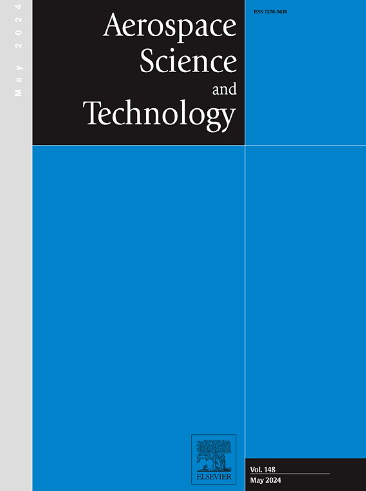穿越大西洋的氢动力无人驾驶飞行器的热控制
IF 5
1区 工程技术
Q1 ENGINEERING, AEROSPACE
引用次数: 0
摘要
Drone Mermoz 项目旨在评估由氢燃料电池驱动的无人驾驶飞机系统穿越大西洋的可行性。这架飞机必须完成 3000 公里的旅程,至少续航 36 小时。除了确保机载能源充足外,一个关键要求是整个推进系统在整个旅程中稳定运行。本文概述了为配备氢燃料电池推进系统的远程无人驾驶飞机系统设计的热管理系统的开发阶段、理论建模和实验测试。这架 4 米长、重量不到 25 千克的飞机计划从塞内加尔达喀尔飞往巴西纳塔尔,行程 3000 千米。开发这种氢动力无人机的一个关键挑战是设计一个高效的热管理系统,以确保机身持续通风。该系统的一侧涉及燃料电池发电以推动飞机,而另一侧则必须有效散发大量热量,以确保整个系统的稳定运行。本文章由计算机程序翻译,如有差异,请以英文原文为准。
Thermal control of a hydrogen-powered uncrewed aerial vehicle for crossing the Atlantic Ocean
The Drone Mermoz project aims to evaluate the feasibility of an uncrewed aircraft system powered by a hydrogen fuel cell, designed to traverse the Atlantic Ocean. The aircraft must complete a journey of 3000 km with a minimum endurance of 36 hours. In addition to ensuring sufficient onboard energy, a critical requirement is the stable operation of the entire propulsion system throughout the journey.
This paper outlines the developmental stages, theoretical modeling, and experimental testing of a thermal management system designed for a long-range uncrewed aircraft system equipped with hydrogen fuel cell-based propulsion. The 4-meter, sub-25 kg aircraft is engineered to undertake a 3000 km journey from Dakar, Senegal to Natal, Brazil.
A critical challenge in developing this hydrogen-powered drone is designing an efficient thermal management system to ensure continuous ventilation of the fuselage. While one side of the system involves the fuel cell generating electricity for aircraft propulsion, the other side must effectively dissipate a substantial amount of heat to ensure the stable operation of the entire system.
求助全文
通过发布文献求助,成功后即可免费获取论文全文。
去求助
来源期刊

Aerospace Science and Technology
工程技术-工程:宇航
CiteScore
10.30
自引率
28.60%
发文量
654
审稿时长
54 days
期刊介绍:
Aerospace Science and Technology publishes articles of outstanding scientific quality. Each article is reviewed by two referees. The journal welcomes papers from a wide range of countries. This journal publishes original papers, review articles and short communications related to all fields of aerospace research, fundamental and applied, potential applications of which are clearly related to:
• The design and the manufacture of aircraft, helicopters, missiles, launchers and satellites
• The control of their environment
• The study of various systems they are involved in, as supports or as targets.
Authors are invited to submit papers on new advances in the following topics to aerospace applications:
• Fluid dynamics
• Energetics and propulsion
• Materials and structures
• Flight mechanics
• Navigation, guidance and control
• Acoustics
• Optics
• Electromagnetism and radar
• Signal and image processing
• Information processing
• Data fusion
• Decision aid
• Human behaviour
• Robotics and intelligent systems
• Complex system engineering.
Etc.
 求助内容:
求助内容: 应助结果提醒方式:
应助结果提醒方式:


